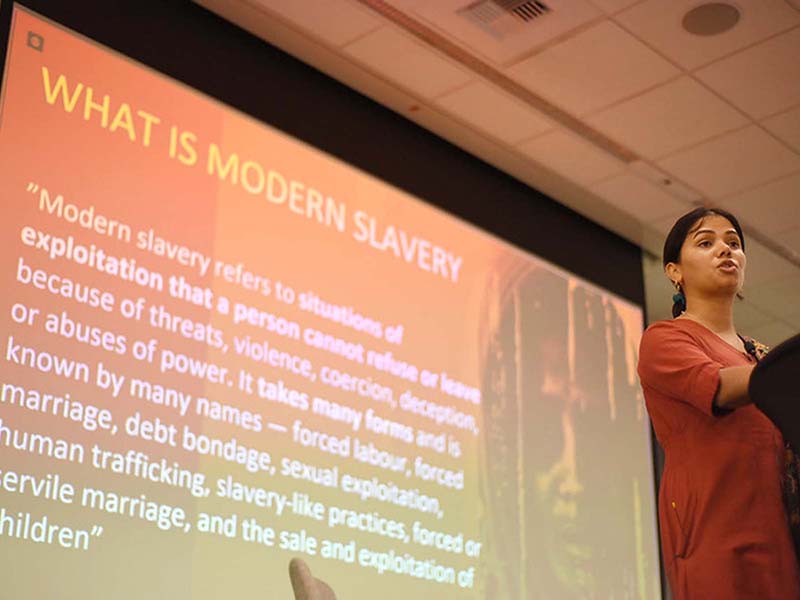
Authors
-

Managing Director, Human Rights and Inclusive Business, BSR
-

Director, Human Rights and Inclusive Business, BSR
As we celebrate Human Rights Day on December 10—the anniversary of the adoption of the Universal Declaration of Human Rights—we are taking the opportunity to reflect on the role of business in shaping a future in which human rights are respected and protected in both law and in practice.
Business touches the lives of people in diverse ways, from workers to customers to community members throughout global value chains. Ensuring respect for human rights across these many touchpoints has never been more important.
The past few years have seen enormous changes in the business and human rights landscape. The emergence and intensification of destabilizing dynamics like climate change, the COVID-19 pandemic, political instability, socioeconomic inequality, and the rapid growth of new technologies with yet unknown human consequences heighten the risk that business activity will adversely impact people. At the same time, businesses are under increased public scrutiny for their human rights footprint, face growing regulatory and legal pressures to proactively manage and remediate these impacts, and are increasingly expected to disclose both human rights impacts and management measures.
Looking Back: Taking Stock of the First Decade of the UNGPs
The UN Guiding Principles on Business and Human Rights (UNGPs) offer guidance to companies on how to manage human rights risks associated with their business activities and value chains amidst these global challenges. Unanimously endorsed by governments 10 years ago in June 2011, the UNGPs lay out the corporate responsibility to respect human rights. They provide guidance on the steps businesses should take to avoid infringing on the human rights of others and to address adverse impacts with which they are involved (Principle 11).
Over the past decade, the UNGPs have given companies a shared roadmap for respecting human rights and spurred progress toward this goal in a business context, demonstrating that changing ways of doing business to reduce harm to people is possible. Yet gaps between aspirations and implementation still remain, leading to the continued occurrence of human rights abuses despite corporate commitments to the contrary. This is due in part to the scale and complexity of today’s global challenges, as well as barriers to change such as corporate capture of the state, lack of meaningful corporate human rights disclosure, and business models with inherent human rights risks.
Looking Ahead: Ensuring Respect for Human Rights in the Next Decade
The UNGPs and its key concept of human rights due diligence provide a powerful normative and practical tool for companies to tackle inequalities and realize a just and sustainable future for all—including in the context of “building back better” from the COVID-19 crisis and the just transition to a low-carbon economy.
The roadmap for responsible recovery during times of crisis, released last month by the UN Working Group on Business and Human Rights, emphasizes the role of business, including financial institutions, in addressing our most pressing global challenges in the next decade.
The roadmap sets out key action areas for strengthening business respect for human rights in the coming decade and leveraging the power of business enterprises to overcome the shared challenges of today and tomorrow. These include strengthening and mainstreaming human rights due diligence across value chains, increasing collective action to tackle systemic challenges, ensuring alignment between the UNGPs and the development of standards and regulations, strengthening access to remedy, deepening stakeholder engagement, and better tracking of progress.
To help companies fulfill their human rights responsibilities and align with the vision set out by the UNGPs and the UN Working Group’s roadmap, BSR has released a series of deep dives on the emerging issues and approaches that are critical to realizing the promise of the UNGPs and closing the gap between aspiration and action.
This month, we released our final installment: an update to our human rights assessment approach. Grounded in the UNGPs, our approach guides companies through the process of identifying and prioritizing their salient human rights risks and impacts. This is the critical first step for business to prevent and mitigate harm to people.
As stated in the UN Working Group’s roadmap, “Respecting people and the planet, by preventing and addressing adverse impacts across business activities and value chains, is the most significant contribution most businesses can make toward sustainable development.”
As we say goodbye to 2021 and move into 2022, we look forward to supporting business across sectors throughout the globe to fulfill the vision set out by the UDHR by shaping a rights-respecting future.
BSR’s latest sustainability insights and events straight to your inbox.
Topics
Let’s talk about how BSR can help you to transform your business and achieve your sustainability goals.







